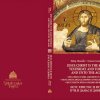Хришћани су већ доживели искуство љубави и милосрђа Божијег и знају да их Он неће оставити ”сиротима”. Као што пролеће опојно делује на све, тако за све хришћане Пасха делује опојно и радосно. И као што ће овогодишње Пролеће за највећи број људи бити недоступан плод, тако ће и Васкрс као литургијски догађај бити многима недоступан. Али, да ли можемо да кажемо да свет не опитује пролеће? Не! Да ли можемо да кажемо да хришћани не опитују Пасху? Никако! Дакле, иако не можемо да се радујемо пролећу у природи, тако не можемо Пасху да славимо у њеном природном окружењу, а то је храм. Али, и Пролеће је ту и Пасха је ту.
A great man is one who collects knowledge the way a bee collects honey and uses it to help people overcome the difficulties they endure - hunger, ignorance and disease!
- Nikola Tesla
Remember, remember always, that all of us, and you and I especially, are descended from immigrants and revolutionists.
- Franklin Roosevelt
While their territory has been devastated and their homes despoiled, the spirit of the Serbian people has not been broken.
- Woodrow Wilson
People Directory
Rastko Petrović
Rastko Petrović (Belgrade, 1898 – Washington, D.C., 1949), poet, novelist, travel writer, essayist, etnographer, giffted sketcher, camerman and photographer. He graduated law in France, and on his return to Yugoslavia he worked as an art and literary critic. After this he was employed in the diplomatic service and posted to Italy and the USA. He is considered to be one of the most important and most influential Serbian writers in the period between the two world wars. . Read more ...Publishing
Jesus Christ Is The Same Yesterday Today And Unto the Ages
In this latest and, in every respect, meaningful study, Bishop Athanasius, in the manner of the Holy Fathers, and firmly relying upon the Apostles John and Paul, argues that the Old Testament name of God, “YHWH,” a revealed to Moses at Sinai, was translated by both Apostles (both being Hebrews) into the language of the New Testament in a completely original and articulate manner. In this sense, they do not follow the Septuagint, in which the name, “YHWH,” appears together with the phrase “the one who is”, a word which is, in a certain sense, a philosophical-ontological translation (that term would undoubtedly become significant for the conversion of the Greeks in the Gospels). The two Apostles, rather, translate this in a providential, historical-eschatological, i.e. in a specifically Christological sense. Thus, John carries the word “YHWH” over with “the One Who Is, Who was and Who is to Come” (Rev. 1:8 & 22…), while for Paul “Jesus Christ is the Same Yesterday, Today and Unto the Ages” (Heb. 13:8).Latest US News
- Волт Богданић: Американац српског порекла добитник три Пулицерове награде за истраживачко новинарство
- The American Srbobran - Building a Partnership with the Library of Congress and Institutions in Serbia
- „Американски Србобран“ унапређује сарадњу са Конгресном библиотеком у Вашингтону и институцијама у Србији
- Преминуо чувени амерички песник српског порекла Чарлс Симић
- Јован Дучић међу великанима у кливлендској башти
- Србија, Африка, Америка и Канада славе дан Теслиног рођења
- Документарац Немање Станковића приказан у Холивуду
- Tesla Rhapsody
- Saved by Beauty: Dostoevsky in New York
- Izložba likovnih radova o Dostojevskom
- Steve Popovich - the man who discovered Meat Loaf
- Odlazak čoveka koji je mnogo uradio za očuvanje sećanja na lik i delo Nikole Tesle
- Naš otac Balkanac za Ruse je smislio bijelu Coca-Colu
- Neverovatan poduhvat srpske pravoslavne zajednice u Americi
- Prva Srpkinja u finalu najveće evropske nagrade za pronalazače
Latest Serbia News
- На Станфорд листи 15 крагујевачких научника
- Naše postojanje skriva mračne i svetle strane, i veliko je umeće prepoznati ih i razlučiti
- Српска застава је најлепша на свету – на основу резултата анкете милион људи
- Недеља америчке културе
- Preminuo pisac Aleksandar Petrov
- Spomenik Branku Pešiću radiće srpski vajar iz Los Anđelesa
- Metropolitan Amfilohije buried in the Cathedral church in Podgorica
- Memorial prayer rite for Metropolitan Amfilohije in the Cetinje Monastery
- На данашњи дан рођен је Михајло Идворски Пупин
- Алекса је стигао до Принстона, али Математичкој гимназији се радо враћа
- Каубој православац и 40 Американаца посетили Косово
- Архив Војводине: Сведочанства времена у спомен на херојске претке
- Премијера „Теслиног народа“ на Коларцу
- Када се велики умови играју науком о подацима
- Američka vojska donirala je vrednu opremu klinici u Nišu





